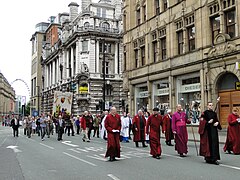| Whitsun | |
|---|---|
 Manchester 2010 Whit Walks | |
| Also called | Pentecost (Western), Trinity Sunday (Eastern) |
| Observed by | United Kingdom and some former colonies |
| Type | Christian, Public |
| Begins | 7th Sunday After Easter |
| Date | Easter + 49 days |
| 2024 date | May 19 |
| 2025 date | June 8 |
| 2026 date | May 24 |
| 2027 date | May 16 |
| Frequency | annual |
| Related to | Pentecost, Whit Monday, Whit Tuesday, Whit Friday, Trinity Sunday |
Whitsun (also Whitsunday or Whit Sunday) is the name used in Britain,[1] and other countries among Anglicans and Methodists,[2] for the Christian holy day of Pentecost. It falls on the seventh Sunday after Easter and commemorates the descent of the Spirit of Truth upon Christ's disciples (as described in Acts 2). Whitsuntide, the week following Whitsunday, was one of three holiday weeks for the medieval villein;[3] on most manors he was free from service on the lord's demesne this week, which marked a pause in the agricultural year.[4] Whit Monday, the day after Whitsun, remained a holiday in Britain until 1971[5] when, with effect from 1972, the ruling Conservative Government decided to permanently replace it, following a five-year trial period, with a Spring Bank Holiday on the last Monday in May. Whit had been the occasion for many varied forms of celebration, and was of significant cultural importance. It was a custom for children to receive a new set of clothes, even among the poorest families, a tradition which continued well into the 20th century.[6][7]
In the North West of England, church and chapel parades called whit walks still take place at this time (sometimes on Whit Friday, the Friday after Whitsun).[8] Typically, the parades include brass bands and choirs; girls attending are dressed in white. Traditionally, Whit fairs (sometimes called Whitsun ales[9]) took place. Other customs, such as Morris dancing, were associated with Whitsun, although in most cases they have been transferred to the Spring bank holiday. Whaddon, Cambridgeshire, has its own Whitsun tradition of singing a unique song around the village before and on Whit Sunday itself.[10]
- ^ Anon. "High Court Sittings: Law Terms". The Courts Service. Archived from the original on 3 October 2016. Retrieved 24 May 2014.
- ^ The Book of Worship for Church and Home: With Orders of Worship, Services for the Administration of the Sacraments and Other Aids to Worship According to the Usages of the Methodist Church. Methodist Publishing House. 1964. p. 126. Retrieved 25 March 2017.
- ^ The others being Yuletide, the week following Christmas, and Easter Week, the week following Easter that ended at Hocktide (Homans 1991).
- ^ George C. Homans, English Villagers of the Thirteenth Century, 2nd ed. 1991:369.
- ^ Banking and Financial Dealings Act, 1971, Schedule 1, para 1.
- ^ "Whit Monday in the United Kingdom". timeanddate.com.
- ^ "The nostalgia column with Margaret Watson". Dewsbury Reporter. May 20, 2017.
- ^ "Whit Friday: Whit Walks". saddleworth.org. Archived from the original on 2008-05-09. Retrieved 2011-06-07.
- ^ Liz Woods. "Feasts and Festivals". feastsandfestivals.blogspot.com.
- ^ Nigel Strudwick. "Reviving the Whaddon Whitsun Song". whaddon.org.
